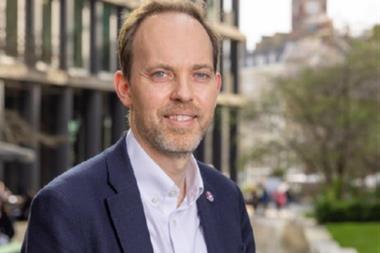Daniel Daggers - better known to some as #MrSuperPrime - is a major player in the London super prime industry.
As founder of Daniel Daggers Real Estate, his focus on digital services and social media has made him a real estate legend to his 70,000 followers. He sat down with Blackstock Consulting’s Andrew Teacher to talk about how the market is changing.
You can listen to this podcast via Apple Podcasts or Spotify or SoundCloud or listen to it through the player below:
As a veteran of the super prime market, Daggers has witnessed structural shifts in the sector, which he thinks will drastically change the buying landscape. “We are seeing a massive change in wealth creation,” he explains. “The biggest difference is the profile of potential buyers and big tenants.”
The arrival of new nationalities to the super prime market, for example, is poised to transform the market. “The impact the Russian community had was massive” he says. “I predict that the impact the Chinese community is going to have on London is going to be massive - times two.”
The most striking change, however, has been the age profile of Daggers’ clients. “The average age of buyers in the super prime sector has come down. I’m working with people in their mid-thirties,” he says. “And I thought that was fascinating, because people in their mid-thirties think very differently.”
This change in the make-up of the super prime client base will have repercussions across the sector, according to Daggers. “I think we’re going to see hyperinflation for best-in-class assets,” he predicts. “The golden postcodes are going to struggle,” he adds, suggesting that the very definition of ‘best-in-class’ is changing.
As the profile of clients evolves, so does what they want in a property. “It’s all about live-style, not lifestyle,” Daggers asserts. “How do you want to choose to live in your home? You can see how tall, thin houses are underperforming duplexes and wider homes.”
This new breed of home is more frequently found in areas that have previously not been considered by super prime clients. “I think certain neighbourhoods like Bayswater, Hyde Park, Ladbroke Grove, Westbourne Grove, and Fitzrovia are going to outperform other golden postcodes, like Knightsbridge, Belgravia, Chelsea. There’s more growth there.”
Daggers has some very clear advice for developers hoping to take advantage of these changing trends. “I would like developers to be braver,” he says. “We have to try and adopt a huge amount of empathy to understand what the customer is looking for. My advice would be: consider who the customers are over the next five years, because it’s changing drastically.”
Social media, and his #MrSuperPrime brand, are key tools in Daggers’ arsenal. Despite amassing tens of thousands of followers, he remains humble about his online persona’s origins. “I was aware,” he explains, “that I needed to become a focal point, a place of gravity for the sector. Hence, the #MrSuperPrime thing.”
Clearly, as Daggers understands, social media is an invaluable tool for any real estate agency - and it’s only increasing in importance. “Selling super prime property is all about getting the message to the customers - and the customers are on digital channels,” he remarks. “If you don’t have any influence over these channels, then you’re blind to your potential audience.”
And the old ways are no longer working - according to Daggers, agencies need to work with one another in order to access the highest returns. “If an agent doesn’t work collaboratively, they won’t give you 100 percent of the market,” he explains. “Therefore it takes you longer to sell, and then you have less people interested in your property, and you won’t command the premium that you want.”
Daggers also looks to diversity as a key area where the real estate sector needs to modernise. “We need a total upheaval of the real estate sector,” he says, “because there is no diversity at the top end of the real estate market in the UK. I very rarely see women, even though the women that do work in the super prime markets tend to be the most powerful. I don’t see any black or brown faces.”
However, it may take a long time for things to improve. “Businesses have a very difficult next five to ten years,” Daggers asserts. “Because, while they are trying to champion diversity, the top parts of their businesses don’t have any diversity. And therefore it’s going to take five, ten years for the diverse group of people to get to the top.”
You can listen to this podcast via Apple Podcasts or Spotify or SoundCloud or listen to it through the player above.
Previous Podcasts:
#108 Property podcast: Carbon pricing is key, says GPE’s sustainability chief ahead of COP26
Apple | Spotify | SoundCloud
#107 The government must show leadership on building safety, says Network Homes
Apple | Spotify | SoundCloud
#106 PropCast: Co-locating homes and commercial space is prime for Londoners and Amazon deliveries
Apple | Spotify | SoundCloud
#105 Modern methods of construction are key to delivery of UK homes, say TopHat and Jo Cowen Architects
Apple | Spotify | SoundCloud
#104 Innovation in construction will require a joint effort from the public and private sectors, says Homes England and Modulous
Apple | Spotify | SoundCloud
#103 Argent’s bosses prefer curation to control
Apple | Spotify | SoundCloud
#102: ULI’s mentorship programme was a career-defining experience
Apple | Spotify | SoundCloud
#101: Soho’s John James has a legacy of supporting independents
Apple | Spotify | SoundCloud
#100: Grainger’s Helen Gordon on the resilience of build-to-rent
Apple | Spotify | SoundCloud
#99: Man Group and ilke Homes on the future of housebuilding
Apple | Spotify | SoundCloud
#98: Liz Peace, Sadie Morgan and Emma Cariaga on diversity and inclusion in the built environment
Apple | Spotify | SoundCloud
#97: Council partnerships are where developers can create social value, says Bruntwood chief
Apple | Spotify | SoundCloud
#96: New strata of “super prime” offices could arise from a pandemic, says BlackRock
Apple | Spotify | SoundCloud
#95: Eden Project’s Tim Smit discusses sustainability ahead of ULI UK Conference
Apple | SoundCloud | Spotify
#94: Evolution away from long leases creates opportunities for investors, says Ian Marcus
#93: Landlords must share risk and promote flexibility to revive high streets, says Shaftesbury boss
Apple | Spotify | SoundCloud





























No comments yet